Text

🍉CDRAMA GOTCHA FOR GAZA DONATIONS NOW OPEN!🍉
Donate to one our selected Palestinian direct aid funds, and you will receive a fantastic fanwork in exchange from one of our many talented creators.
Please read our carrd first, particularly the 'donation information' section, and then peruse our available fandoms.
These are the Palestinian direct aid funds we have chosen for this project. You may donate to ANY of them (and you may ask for a fanwork for each donation you make).
@CareForGaza
Their paypal link and their gfm link are in their pinned tweet. Check out their account to see all they do!
Plus the following verified gofundmes:
Suad Alkurdi and family: €4,686 raised of €50,000 goal
Abdallah and Salaam Animal Care: $35,300 raised of $40,000 goal
Mohammad Wishah and family: €8,801 raised of €71,500 goal
Moutasem Quffa and family: €8,682 raised of €65,000 goal
Once you've made your donation and read our carrd, go and request your fanwork here! Have fun. From the river to the sea.
🍉
224 notes
·
View notes
Text

🍉SIGNUPS FOR CDRAMA GOTCHA FOR GAZA CREATORS NOW OPEN!🍉
We are a fundraiser event dedicated to creating fanworks in exchange for donations to the people of Palestine. Creator signup is now open for fanfic authors, fanartists, vid makers, and graphics/gif creators.
Once creator signups close, for small donations of at least 5.00-8.00 USD to Palestinian direct aid organizations, you will be able to receive a fanwork from one of these talented creators
CREATOR SIGNUPS OPEN: March 30th, 2024 to April 14, 2024
All creators welcome! Whether you can create for three or one hundred fandoms, we'd love to see you on board. Fanartists, fic writers, fanvid creators, and gif/graphic creators can sign up.
Please visit our CARRD HERE for more information on both how to create and how to donate.
Then, if you are a creator, go sign up here.
You can also follow our twitter here.
Inspiration is @SVSSSAction, @TGCFAction , and @MDZSaction on twitter.
We greatly appreciate you promoting our project, even if you can't participate yourself. As this is a multi-fandom event, we need all the plugging we can get. Thank you!!
-Cdrama Action Team
333 notes
·
View notes
Text

🍉SIGNUPS FOR CDRAMA GOTCHA FOR GAZA CREATORS NOW OPEN!🍉
We are a fundraiser event dedicated to creating fanworks in exchange for donations to the people of Palestine. Creator signup is now open for fanfic authors, fanartists, vid makers, and graphics/gif creators.
Once creator signups close, for small donations of at least 5.00-8.00 USD to Palestinian direct aid organizations, you will be able to receive a fanwork from one of these talented creators
CREATOR SIGNUPS OPEN: March 30th, 2024 to April 14, 2024
All creators welcome! Whether you can create for three or one hundred fandoms, we'd love to see you on board. Fanartists, fic writers, fanvid creators, and gif/graphic creators can sign up.
Please visit our CARRD HERE for more information on both how to create and how to donate.
Then, if you are a creator, go sign up here.
You can also follow our twitter here.
Inspiration is @SVSSSAction, @TGCFAction , and @MDZSaction on twitter.
We greatly appreciate you promoting our project, even if you can't participate yourself. As this is a multi-fandom event, we need all the plugging we can get. Thank you!!
-Cdrama Action Team
333 notes
·
View notes
Text
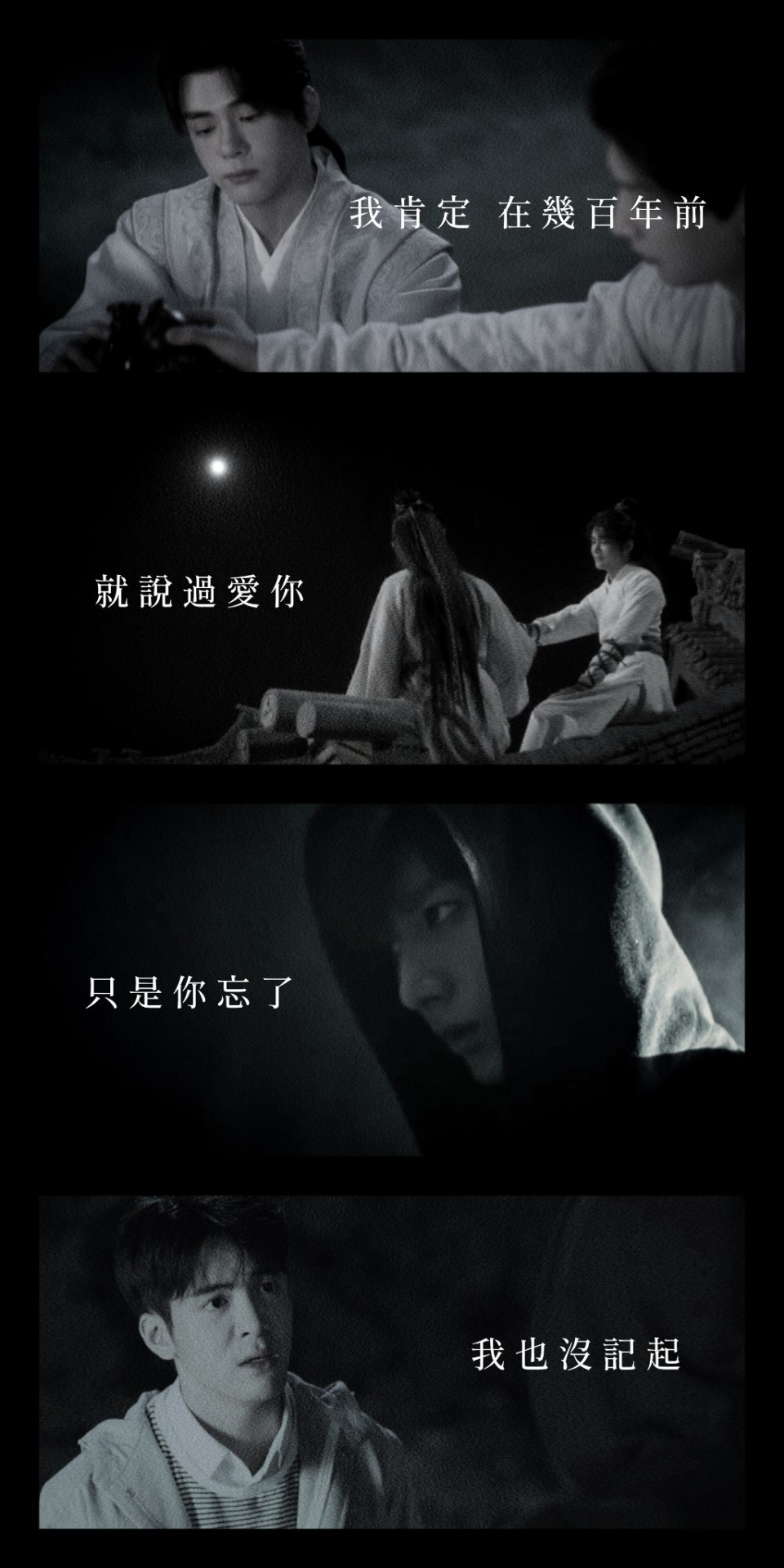
I must have told you, hundreds of years ago
That I love you
It's just that you've now forgotten
And I can't recall it myself
Mysterious Lotus Casebook (2023) + The Lost Tomb 2 (2019) & Ultimate Note (2020) // 愛人錯過, Accusefive
#not mine#fanghua#li lianhua#fang duobing#mysterious lotus casebook#pingxie#zhang qiling#wu xie#dmbj#truly im gonna be sick#my beloved “god” and human trope... my love for you made me mortal#aghhhhg [crying cat meme]#可怜的小宝...... 没事的,生生世世你定会遇上他#the reason xiaoge fights so hard to protect wu xie is bc his soul remembers how much fang duobing cared for him...#i'd come up with this idea for ChouShi actually but also like... wu xie finding li lianhua's tomb#every corner and surface touched by fang xiaobao's loving hand#i loved you once; i will love you again#always and always i will love you#这该死的宿命感 哭死我了
99 notes
·
View notes
Text
🪷 The Lotus Flower in Mysterious Lotus Casebook 🪷
i. Growing Deep Roots
As noted by difeisheng, Li Xiangyi is an image more than he is a person. He’s the “symbol” and “beating heart” of the Sigu sect; “he embodies everything [the sect] stands for” and “has become one with every person he represents” in his role as a leader. As such, one might say he doesn’t exist as an individual who’s allowed the luxury of flawed, fluid humanity. Rather, he’s fixed into an object: a shield protecting those under his care, a mirror reflecting those he’s taken upon himself to be the champion for.
While a heavy burden to carry, this identity as image is also shown to be brittle, hollow, like a hazy mirage which is more dazzling appearance than substance. Even Fang Duobing introduces Li Xiangyi to Li Lianhua by showing him a painting of his shifu — ink on a page, a person turned into a hero to be worshipped and idolated.
Li Lianhua, over the ten years that pass after the Great Battle of the East Sea, works to plant and cultivate a new identity in the same way one might grow flowers. Li Lianhua forms deep roots and grows out of the mythical hero’s shell he’d been carrying as Li Xiangyi, thus developing an identity which is solid and grounding in contrast — an identity which involves “walk[ing] within a crowd instead of [soaring] above it.”
This shift from image to person is itself rooted in the lotus mantra (written by Buddhist Layman Pang during the Tang Dynasty) which Li Xiangyi first encounters after monk Wu Liao rescues him:
一念心清净
莲花处处开
The heart attains peace with a single thought;
Lotus flowers bloom all around.
Although the exact timeline is left to interpretation, it’s implied that the lotus mantra operates as a catalyst of change for Li Xiangyi and that he changes his name to Li Lianhua after reading it. Now what is it about it that speaks to Li Xiangyi so deeply in that moment? As noted in 《 人間福報 》, the lotus mantra teaches us that a pure heart will result in an open and enlightened mind. One subtle, profound thought rife with compassion is enough for a person to glimpse Buddha in a flower, a leaf, a grain of sand or a speck of dust. In short, “if you can find peace within yourself, then you will find peace everywhere.” Perhaps Li Xiangyi, at his lowest point, finds solace in the prospect of stripping his life down to its very core and searching for purity, wisdom and peace within his troubled heart.
By renaming himself 莲花/liánhuā lotus flower, Li Lianhua takes his destiny into his own hands; he empowers himself into reshaping his identity and laying down the foundations for the person he wants to become. Similarly to The Yin-Yang Master: Dream of Eternity which tells us that “names are the shortest spells in the world,” Li Lianhua’s new name functions as a spell which speaks a new him into existence. It’s a deliberate choice, a conscious attempt at breaking free from the suffocating shell Li Xiangyi was trapped in and become a person of his own choosing.
The act of (re)naming notably also extends to Li Lianhua’s abode which he dubs 莲花楼 “Lotus Tower.” In addition to this significant choice of name, it’s interesting to note that Li Lianhua starts growing vegetables inside Lotus Tower when he’s left with nothing after his demise at the East Sea and is facing starvation. As such, his home is quite literally a site not only of self-sustenance and survival, but also of growth — a growth which requires hard work, patience and faith and nearly brings Li Lianhua to tears when his hopes are finally rewarded and the seeds he planted begin sprouting. The act of physically planting vegetables and learning to cook those vegetables speaks of a refreshing and grounding simplicity — of something disarmingly vulnerable and human after playing the role of a god-like figure. Li Lianhua has sweat on his brow and hope in his heart; he plants seeds, watches them grow and keeps himself alive by his own hands.
It seems it’s not only Li Lianhus’a home, but also his very person, which steadily grow into a lotus flower. Li Lianhua wears a variety of hairpins directly linked to the lotus, and the colour coding of his garments moves from the red he used to wear as Li Xiangyi to a lighter palette filled with greens and blues — colours which are more obviously linked to nature.
ii. Life Borrowed and Given Away
The lotus, both traditionally and within the drama itself, is closely connected to the theme of rebirth. On a literal level, the exotic lotus flowers of Cai Lian Manor grow directly from the corpses of the victims drowned in the pond, thus embodying life born from death. thawrecka writes in their story that Li Lianhua is “nothing but a lotus nurtured by a walking corpse, a body that doesn’t realise it should already be dead.” On a figurative level, the lotus grows in muddy water but blooms unsullied every morning, thus symbolising rising from a dark place and growing into something beautiful and colourful despite all the odds. The different stages of the lotus’ blooming can be taken to represent the beginning, middle and end of a spiritual path in Buddhism — a parallel to the theme of 趟/tāng taking a journey which underscores the drama in various ways.
Li Lianhua’s journey, more specifically, is that of a lotus being reborn. The soundtrack piece 《 一壶莲花醉 》 “A Pot of Lotus Wine” emphasises this connection in the following lines:
问一句莲花的悲喜
断一柄弃剑入青泥
I ask about the joys and sorrows of the lotus;
A broken, abandoned sword is thrown into the mud.
Not only does Li Lianhua keep stressing at different points of the drama that Li Xiangyi is dead and all that is left behind is Li Lianhua; he even breaks his own sword Shaoshi at the end of the story, thereby physically reenacting a process of destruction—death—and rebirth. As Li Lianhua writes in his farewell letter:
剑断人亡
My sword is broken, and I will be gone.
The significance of Li Lianhua’s action is further intensified here by the fact that the sword in the song is said to be thrown into 泥/ní mud, the site from which a lotus flower grows.
Considering that Shaoshi operates as a device embodying Li Lianhua’s character development throughout the drama, the fact that Li Lianhua decides to break it in the last episode should be taken as a key moment in which he chooses how his own narrative is going to end. Li Lianhua decides to kill for good the glorious image of Li Xiangyi which has become sullied with pain and regret in his heart, so that a simple, fragile peace can begin growing in its place like a lotus flower amidst the mud.
However, the tragedy of Li Lianhua’s narrative is that the rebirth he works to achieve for all these years is not his own to enjoy and never was intended to be. After the Great Battle of the East Sea, as Li Lianhua is reborn from Li Xiangyi and starts planting seeds all around him, he has already accepted that he’s nothing but a ghost, “wandering in the jianghu to close his loose ends and finally [...] vanish without a trace, not even a body left behind.” As mx-myth remarks, even the shift in his garment colours to an overwhelming amount of white as the story progresses makes it clear that he’s resigned to go and has “already started dressing for his own funeral.”
The lotus flower symbolism permeating the narrative accentuates this bone-deep, unshakable resignation. While imprisoned by Jiao Liqiao, Li Lianhua is full of an aching, bittersweet fatalism when he recites a section of Guan Hanqing’s《 窦娥冤 》“The Injustice to Dou E”:
花有重开日
人无再少年
不须长富贵
安乐是神仙
Flowers will blossom again,
But a man can never be young again.
Seek not eternal wealth;
You only need to be content.
Independently from the original meaning of the lines written by Guan Hanqing, the words seem to take on a sad, wistful quality when spoken with a bitter smile by Li Lianhua. In this scene, while the speaker reflects that rebirth occurs outside of themselves in flowers, they acknowledge that their own reality is one inevitably bound to end in old age and decay. Instead of looking forward to a bright future, the speaker doesn’t express any dreams nor ambitions and is only grateful that they’re alive this minute, this second, without any future prospects awaiting them. Perhaps a similar sentiment is reflected in the following lines from 《 一壶莲花醉 》 “A Pot of Lotus Wine”:
了了心事只
不负众生 而已
After settling my worries,
I just want to live up to all sentient beings.
Li Lianhua’s connection to the lotus flower, in fact, was always meant to be one of non-attachment. While Buddhism believes desire to be the root of all suffering, the lotus symbolises non-attachment due to being “rooted in mud (attachment and desire)” while “its flowers blossom on long stalks unsullied by the mud below.” This explains in part why the lotus is considered pure and noble. For Li Lianhua, this non-attachment takes on sorrowful connotations: it means that he stubbornly refuses to reap the seeds he sows and focuses his purest heart and will into ensuring those around him get to reap them instead. Non-attachment means allowing himself enough (a roof over his head, food on his plate) to survive, but rarely letting himself indulge in the precious luxuries of reciprocated love and care — of carefree joy and thirst for adventure.
The ten years he lives after his first death at the East Sea are, for him, only borrowed time he didn’t deserve — borrowed time not dedicated to himself, but rather dedicated to others.
In many ways, Li Lianhua’s path effectively goes full-circle by the end of the narrative. When he and Di Feisheng reminisce about the moon they remember from ten years ago, they conclude that today’s moon isn’t any brighter than the one alive in their memory: rather, it remains constant, unchanged, as though the past ten years never existed as anything other than a short pause in the story, a coma, long enough for wrongs to be righted but not for an already-dead person’s fate to be changed.
It’s interesting and particularly significant that the Styx flower (忘川花, from 忘川 “River of Forgetting” in the original Mandarin) is said throughout the drama to be the only thing capable of saving Li Lianhua’s life. In traditional Chinese culture, the Styx or River of Forgetting is part of the process of reincarnation; only by crossing it (and forgetting everything they’ve ever experienced and everyone they’ve ever loved) can a person finally reincarnate. For Li Lianhua, salvation through rebirth comes at a high cost — a price he’s evidently been ready to pay since the beginning, even if it means turning him into a ghost who must vanish from the story in order for those around him to grow and thrive further.
When Li Lianhua breaks his own sword to allow for rebirth, it’s not himself he’s saving. His sole purpose throughout his journey as Li Lianhua is to use whatever meagre strength he has left, whatever passion and drive are still alive in him, to save the world in any small ways that he can. He becomes a doctor who heals people; he looks for answers and solves mysteries to atone for the sins he thinks he has committed and rectify the mistakes he thinks he has made, so that those he has hurt can finally find peace and comfort.
The most powerful legacy Li Lianhua intends to leave behind by the end of the story has nothing to do with himself and everything to do with the people around him who he never truly admits he loves — the messy, imperfect world that’s caused him so much pain but that he nevertheless insists on saving with everything he has.
Most strikingly, Li Lianhua chooses—whether consciously or not—to leave the life and future he’s renounced for himself to his companions Fang Duobing and Di Feisheng. The only traces he purposefully leaves behind live in them: in the Yangzhouman coursing through Fang Duobing’s body; the home, dog and recipe book he passes onto him; the worthy opponent he leaves for Di Feisheng to fight in his stead after he’s gone…
Fang Duobing, by the end of the story, has grown into more than a disciple and a friend to Li Xiangyi/Li Lianhua: he himself has become the lotus flower bringing renewed life after Li Lianhua has left the narrative, thereby taking Li Lianhua’s legacy into a hopeful, vibrant future. As mx-myth mentions in their colour analysis, Fang Duobing notably wears bright pastel tones including a large amount of green/blue — a colour coding which emphasises Fang Duobing’s connection to spring and, by extension, new life and beginnings. “Life will always go on if there’s spring”; and so Fang Duobing’s youth, vitality and optimism can grow in the empty space left behind by Li Lianhua after he fades into the autumn of his life.
While Li Lianhua’s predominantly light colour palette might appear to align him with other characters in the drama who have left the past behind and are looking towards the future, Li Lianhua made peace long ago with the knowledge that he’s destined not to belong in that future. Just as the Lotus Sutra teaches us that “the inner determination of an individual has great transformative power” and “gives ultimate expression to the infinite potential and dignity inherent in each human life,” Li Lianhua focuses all his transformative efforts on creating a future which, despite having no place for him, will be fertile ground for the entire martial arts world to grow deep, healthy roots. In Li Lianhua’s own words:
幼芽生枝 新木长成
武林也一样
这未来如何
谁又能说得清楚呢
The young sprouts and the new trees grow.
The martial arts world is the same.
What does the future hold?
Who can say clearly?
Should we say, then, that Li Lianhua’s story is one of sacrifice, self-renunciation and resignation — of drifting inevitably towards death as a flower carried by a stream? As he disappears on a boat and is asked where he’s going, Li Lianhua gives a response which echoes his first death at the East Sea in a way that feels entirely deliberate:
小舟从此逝,
江海寄余生
From now on I would vanish with my little boat;
For the rest of my life on the sea I would float.
How are we to understand a person being reborn simply so they can pass on that new life to others, and being convinced that their only true value lies in their death?
Perhaps, in spite of it all, we can find some small comfort in the knowledge that, no matter how sorrowful Li Lianhua’s fate, it’s at least one that he chooses — one that he has full control over, even poisoned and robbed of his life force as he is. As the lyrics of 《 一壶莲花醉 》 “A Pot of Lotus Wine” underline, “it’s just a matter of picking an ending that you like.” Perhaps that’s all that truly matters.
wuxia-vanlifer makes an excellent point when asking: “What would be more tragic? That he never believed he was loved? Or that he did, but vanished anyway?” While I don’t have an answer to offer, there’s one thing I can say. Li Xiangyi, Li Lianhua — they live and die by love. They can’t conceive of themselves as anything other than a sacrificial tool because, for all that they pretend to be aloof and untethered, they actually love others—and the world—in a bone-deep, profound way they’ve never loved themselves. That love is not only the true driving force behind Li Lianhua’s character and the fate he chooses: it’s the beating heart of the entire drama.
“In this life, I have loved and I have been loved. That is enough.”
Shoutout to the following authors and bloggers whose brilliant words and ideas inspire me, as well as this gorgeous video 💖
ao3: @extraordinarilyextreme @thawrecka
tumblr: @difeisheng @extraordinarilyextreme @mx-myth @wuxia-vanlifer @xinyuehui
#mysterious lotus casebook#莲花楼#li lianhua#not mine#meta#ahhhh it's finally out!!!#(love the references to 晴雅集 - i always think it's important to draw#parallels across medias#bc it's like the universality of humanity right)#thinking about LLH's line: 从前那样很好,现在这样也很好。#ultimately LLH was able to set everything down#but at the same time... the one person he couldnt let go of - was FDB#he never cared about being misunderstood except when it came to FDB#a broken flute - that was carefully picked up#一刀两断: except LLH *had* to explain himself to FDB#and at the end he even says “it's not that i wish to die”#“i did not take you as my disciple for nothing”#the shattering of Shaoshi... the relinquishment of the Wangchuan Flower...#(maybe im connecting dots that dont even exist LOL) but#just... forever thinking about how LLH gave up his chance to live.. for FDB#to save the Fang family#LLH loved him - there is no denying this#(even if you ignore all the romantic tropes they fit)#and Xiaobao.... “One cannot love a person back to life.”#ah... and thinking about the JJK0 quote again: “Someone who doesn't want to be saved is like the setting sun sinking into the mountains.”#it's not even necessarily about being saved too -#just that the drama version of LLH could not forgive LXY#truly this was such a wonderful story and exploration of grief and human-ness#of making mistakes and the mess of relationships#it's no wonder this drama resonated with so many people
72 notes
·
View notes
Link
Hello all,
I am finally publishing this fic! Thank you to @redemption-revenge and @extraordinarilyextreme for inspiring this fic and to @nutcasewithaknife for betaing this in like, November. I don’t think I’m going to be writing for Mysterious Lotus Casebook again anytime soon, so this to me is a bookmark on my MLC fic writing journey. Thank you to everyone in the fandom, yall mean more to me than you know!
Summary:
For a moment, fervent joy rushes up and towers over Fang Duobing like a wave, leaving him with weak knees and shaking hands. He’s alive. Li Lianhua is alive!
He’s alive. Fang Duobing’s hands had also shaken as he’d turned over the corpse with Li Lianhua’s beloved face, never even thinking to question the differences in its body. As quickly as it came his joy crashes back to earth, leaving Fang Duobing feeling vaguely numb.
He’s been staring too long. Their eyes meet, Li Lianhua’s posture stiffening slightly.
If he were younger, he’d have shouted the city walls down. As it is, he lets his gaze fall away, noting Li Lianhua’s slump of relief as he does.
#mysterious lotus casebook#莲花楼#angryteapott#fanfic#not mine#so. SO. good.#had my heart aching the whole way through#feels like realistic yk#the pains of falling head over heels in your youth#getting your heart utterly ripped out#then growing up and growing around that grief#then the tension of reuniting again as strangers and adults...#so good#thank you for this
17 notes
·
View notes
Text
from the 20240225 Livestream (OS was added by this Weibo user)
Any mistakes are my own.
#white cat legend#大理寺少卿游#bingshi#li bing#chen shi#ding yuxi#zhou qi#wa er#ding jiawen#wei zheming#my translation#pls the first time i watched this i cackled so hard at how quickly DYX leapt in like 'to help Alibaba move houses?' HASDLFIEI#also DJW + Wa Er = captains of bingshi ship
30 notes
·
View notes
Text
from Wei Zheming's 20240310 livestream
Any mistakes are my own.
#white cat legend#大理寺少卿游#my translation#qiu qingzhi#yi zhi hua#qiuhua#wei zheming#wang xichao#“tame”.... also “domesticate”....... :')))#lol that one cnetz who was like#how can YZH not be mad?#the poor stray came to Shendu only to discover that his litter scooper found another cat#also it's official guys#WZM confirmed that QQZ is YZH's litter scooper
17 notes
·
View notes
Text
from a cut segment of 《大理寺少卿游》专访:周奇 White Cat Legend Exclusive Interview: Zhou Qi
Any mistakes are my own.
11 notes
·
View notes
Text
from 《大理寺少卿游》专访:丁禹兮 White Cat Legend Exclusive Interview: Ding Yuxi
Any mistakes are my own.
16 notes
·
View notes
Text
青玉案 · 元夕 - 辛弃疾 english translation (and notes!)
ok well. all this chinese poetry posting has put me on a bit of a translation high so i wanted to share my most recent translation project, which i actually just finished recording and uploading yesterday after two whole months of waffling. the poem itself is SO fucking cute but SO hard to translate and i'm honestly very proud that i stuck with it to the end. it instantly became one of my top favourites the very first time i heard it so i hope other people can also find some joy from it!
here is the original:
青玉案 · 元夕
【宋】 辛弃疾
东风夜放花千树,更吹落、星如雨。宝马雕车香满路。凤箫声动,玉壶光转,一夜鱼龙舞。
蛾儿雪柳黄金缕,笑语盈盈暗香去。众里寻他千百度,蓦然回首,那人却在 灯火阑珊处。
and here is my translation:
Qing Yu An: Lantern Festival at Dusk
by Xin Qiji
Fireworks blossom beneath the touch of evening's eastern breeze; flurrying as they fall, sparks shower like stars. Prancing steeds pull chiseled carriages, sweeping fragrance across the path. The xiao’s decadent notes adrift, the jadelike light’s prismatic shift; the dragon-fish dance as the night-hours pass.
Combs shining in their hair, golden, silver, silken sway; sweet perfume and tinkling mirth linger in their wake. My searching gaze is futile as I scan the thronging crowds; at last I turn, and you are there, in the quiet dark of evening wane.
translation notes beneath the cut! there is a LOT, be warned!
translation notes:
so to start from the very top, let's first introduce the title 青玉案 · 元夕.
青玉案 (pinyin: Qing Yu An, lit. the matter of the verdant jade) is actually the name of a 宋词排名 (song cipaiming, song dynasty poetic/musical form). just as shakespeare wrote sonnets and basho wrote haiku, so the poets of the song dynasty wrote, among hundreds of other forms with fun names like this, Qing Yu An poems.
each 词排名 had a set number of characters per line, set rules for its tone patterns, and even came with its own tune. maybe a better western parallel would be twinkle twinkle little star, which uses the same tune as the alphabet song and baa baa black sheep.
the end result is that there are many titles under the heading of Qing Yu An, and even, according to chatgpt, another 青玉案 · 元夕.
anyway, this one by Xin Qiji, the most famous one, is titled 元夕 (yuanxi); 元 refers to 元宵节 (yuanxiaojie), the lantern festival held on the fifteenth day of the lunar new year which marks the end of the spring festival/chinese new year, and 夕 is dusk. hence a very naturally poetic name, lantern festival at dusk.
before i get into the text of the poem, i want to note that i often sacrifice rhythm/rhyme for precision of meaning. i ✨artistically✨ speed up/slow down some syllables while recording to preserve some sense of metre lol, but it does read quite awkwardly on paper. i'm a very inexpert student and have a lot to improve on!
ok so! line by line!
东风夜放花千树
--is a literally genius pun. it transliterates as: the east wind in the evening blows open the flowers of a thousand trees. very spring, right? haha spring festival get it.
however! its a chinese celebration, so what will there definitely be? fireworks 😎 and it just so happens that one word for "setting off fireworks" in chinese is 放烟花 (fang yanhua). yep, that's the same 花, which means flowers, but when combined with 烟 (smoke), it becomes a "fire-flower" 🎆!!
it's also the same 放, which in the context of actual flowers means the opening of petals, but in the phrase 放烟花 means to set off (the fireworks).
together, this line evokes both the blooming of the spring flowers under the eastern breeze* and the blooming of a thousand fireworks in the evening sky.
*spring comes from the east ofc; this is folklore and not science i think but lends to the spring-ness of the line
更吹落,星如雨
this one is pretty straightforward. lit. blown through the air by aforementioned wind, falling like a rain shower of stars.
宝马雕车香满路
oh boy. when i tell you my mom (who is my chinese teacher) and i got in several petty arguments over baomadiaoche...
so 宝马 (baoma) are just well-bred horses, prize steeds with a pedigree. a 雕车 (diaoche) (lit. carved chariot) is a very expensive carriage carved with lots of intricate decorations. in other words, these ppl are RICH.
however, it was difficult to convey the sheer decadence of 宝马雕车 without either using a miles worth of syllables or entirely losing the original cultural context. carved was too direct and ugly to hear besides, etched was not elite enough, sculpted conveyed entirely the wrong image... also, for some reason, "proud" to describe steeds was vetoed for being inaccurate???? hence the arguments.
in this scenario, the final word choice really is a matter of the least bad option.
at the same time, the second half of this line 香满路 (lit. fragrance fills the path) implies movement: the carriage is passing by, leaving the fragrance of rich people perfume in its wake. for the sake of syllables, i shifted that movement to the fragrance part of this line. i also like that this evokes a high-headed noble sweeping elegantly through the crowds.
overall, this line adds to the picture of a decadent, bustling market street during the most joyous celebration of the year.
凤箫声动,玉壶光转,一夜鱼龙舞
lit. the notes of the phoenix xiao (chinese recorder) move, jade gourd light shimmers, the fish dragons dance all night.
chinese ppl, ok, use two motifs to describe the beauty and virtue of every artistic thing ever: phoenix and jade. phoenix xiao means NOTHING. it's like virtuous xiao. jade gourd is a little harder; some say it's the moon, some say it's the lanterns. jade and light put together kinda implies moon anyway, so i just sidestepped the problem entirely.
as for 鱼龙 (lit. fish dragons), theyre a type of dragon lantern which supposedly has some characteristic of a fish. they are puppet-danced on sticks - dragon dancing, the classic. my mom and i both had a vivid image of this dragon-lantern-dancing, but we couldn't find it ANYWHERE. if anyone knows the right search query to pull this up, please lmk how to tame 谷大哥*. anyway, i left the lanterns implied because idk how the fuck to explain this whole thing in four syllables.
*lit. big bro google. its funnier in chinese
蛾儿雪柳黄金缕
this is the line that, when i finally bothered to properly research it, made everything about this translation click into place. these are all hair decorations. 蛾儿 (lit. li'l moth) are silk moths, 雪柳 (lit. snow willow) are silver tassels, and 黄金缕 (lit. yellow-golden cords) are gold cords lmao. hence golden silver silken sway, which was SO satisfying to come up with.
笑语盈盈暗香去
lit. laughing speech tinkles and faint fragrance goes by. this one is also fairly straightforward. 去 means to go, so we specifically want the image of a group of giggly teenage girls fading into the crowd.
众里寻他千百度。蓦然回首,那人却在 灯火阑珊处。
and finally we reach the most famous line, the 千古名句 (qiangumingju) - iconic line of a thousand histories!
lit. within the crowd, searching for him* in a thousand hundred directions; suddenly the head turns, it turns out that person is standing in the darkness where the lights have gone out.
*"him" is highly debated. 他, used in modern chinese like the pronoun "he", was historically a catchall pronoun for people of any gender. iirc, 她 for "she", and the gendered distinction, was only introduced when china started integrating to the west. in this line, 他 could be the teen girl that just passed by, or her beau. whichever way, one is the searcher, the other is the searched. i chose here to sidestep this by using i and you bc fuck gender.
anyway, when the searcher's head turns - even this bit had to be suitably poetic, a nightmare - they find their lover in the 灯火阑珊处.
灯火阑珊处 this phrase refers to a very specific image. imagine, in the early hours of the morning, a dwindling market street; the stands are closing one by one, lights winking out, leaving a gentle blanket of dark and calm behind. it is the quiet after the rain, the breath after the shout; it is the sigh of closing your front door at the end of the night. it's not the absence or complete lack of light, but rather the exit of it. a place of that just-left-behind dark is a 灯火阑珊处.
this sentence gave me so much grief and i am so proud to have done it even just a little bit of justice.
so after all that, the scene described by this poem is something like this: a lively late-night market street. people from many walks of life fill the path, celebrating the lantern festival, the turn of a new year and coming of spring, a riotous party of light and noise and joy. as the night slips into the sixteenth, the market begins winding down, stalls closing and lights winking out. amongst the teeming crowds ambling their way home, a young person searches for the their lover from whom they were separated; on some sudden instinct, they turn, to find their lover already looking back from the darkness of the fading festival, gaze caught in the divide between light and dark, wake and sleep: a quiet young love on the edge of spring, something fresh and new.
if anyone made it to this point, thank you and i hope this was an interesting read! please feel free to add comments questions and observations!! i would love to discuss at any level with someone other than my mom and chinese poetry truly is one of my passions even when it makes me want to kill, so i'm always down to talk. :] <3
28 notes
·
View notes
Text
From this Weibo cut of their livestream.
Any mistakes are my own.
Bonus DMBJ easter egg:

#white cat legend#大理寺少卿游#chen shi#li bing#bingshi#zhou qi#wa er#my translation#i literally owe wawa my life#everybody say thank you wawa
13 notes
·
View notes
Text

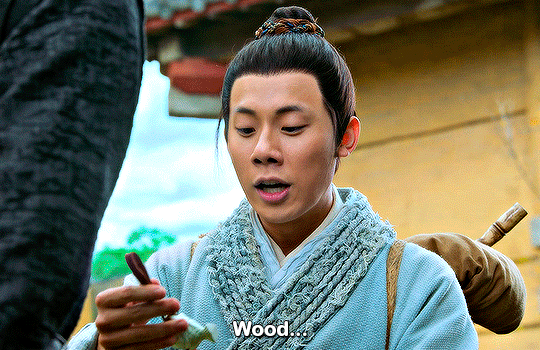
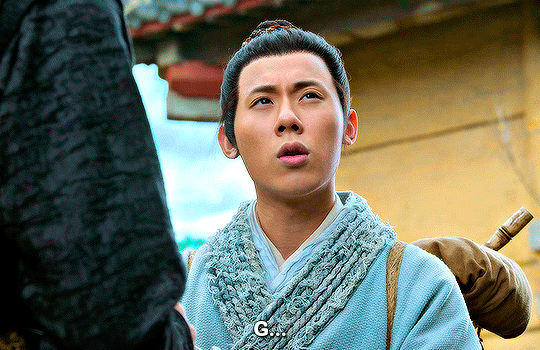
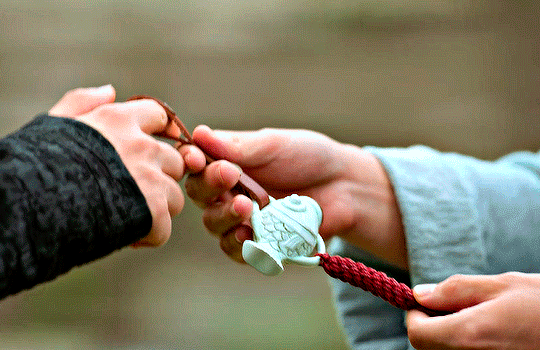
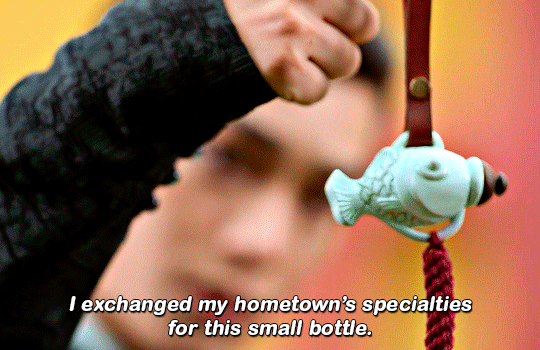
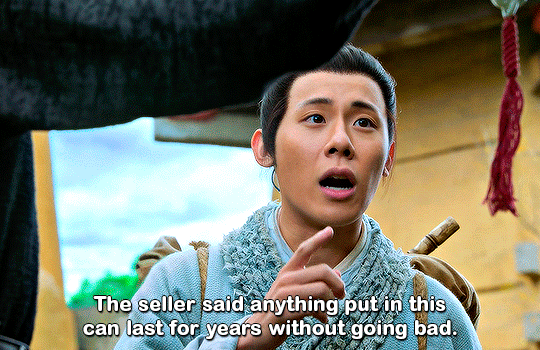

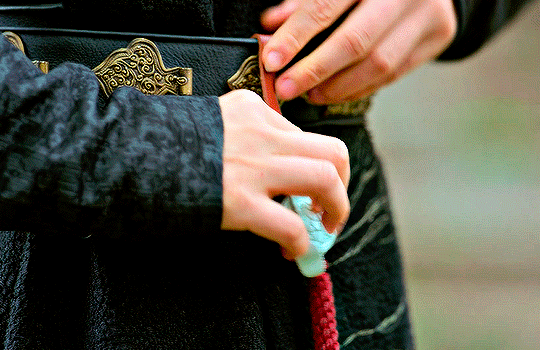
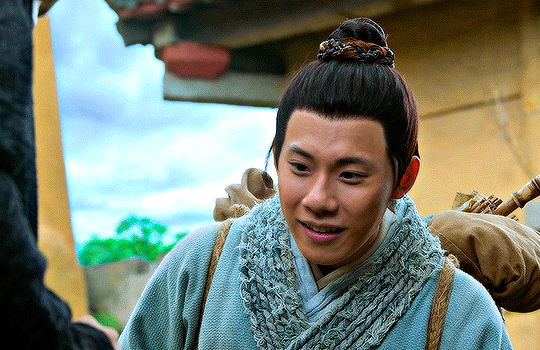
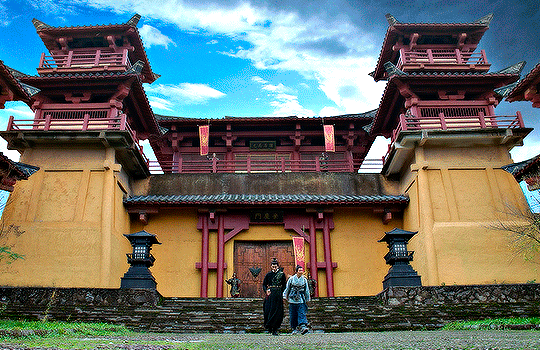
White Cat Legend
大理寺少卿游, episode 06, 2024.
113 notes
·
View notes
Text
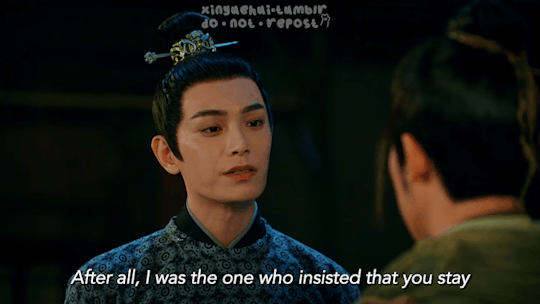
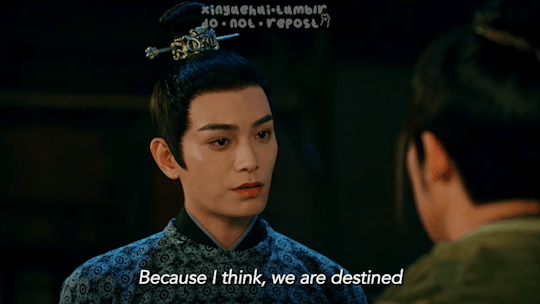

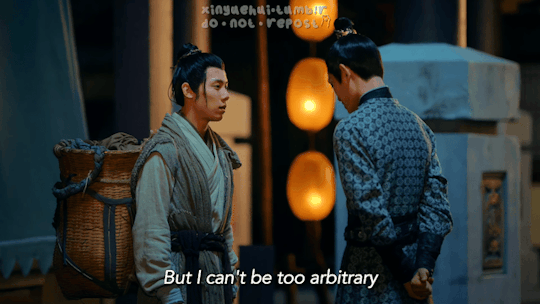

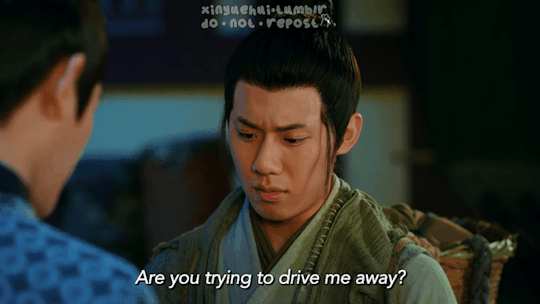

A confession and a breakup QAQ
大理寺少卿游 · White Cat Legend
Bonus:

#大理寺少卿游#white cat legend#not mine#bingshi#“Because I feel that... the two of us have a fated affinity.”#我哭死了#li bing#chen shi#xinyuehui
123 notes
·
View notes
Text

大理寺少卿游 / White Cat Legend (2024) ep. 19
21 notes
·
View notes
Text
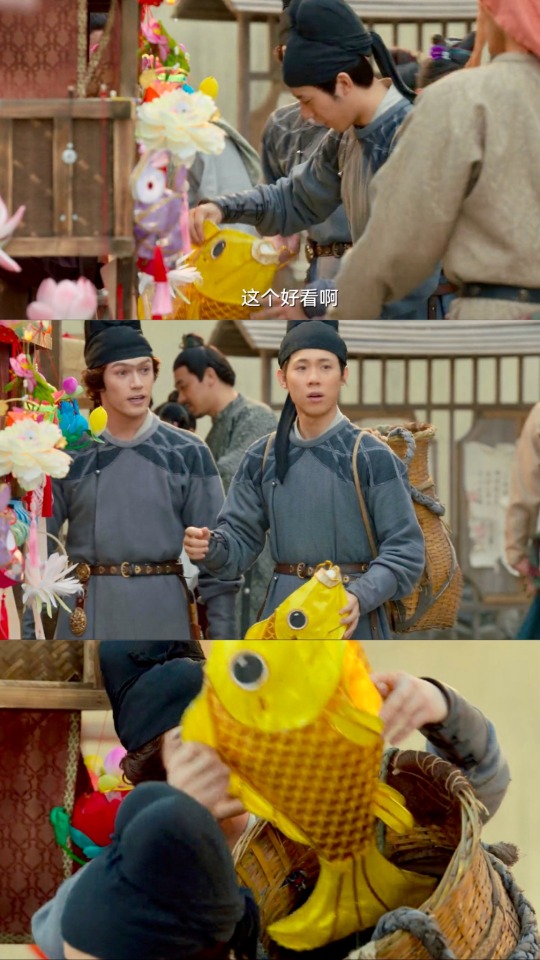
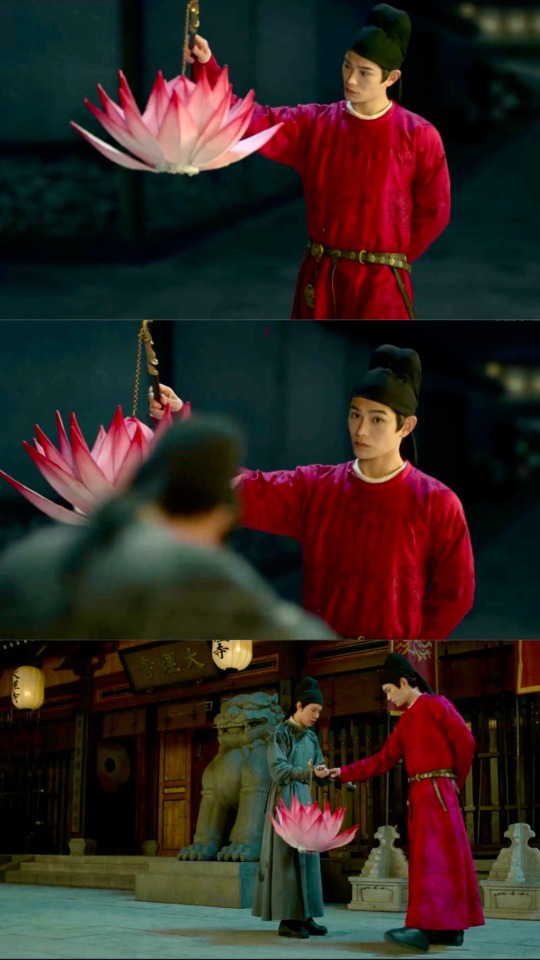
大理寺少卿游 / White Cat Legend (2024) eps. 11-12
#white cat legend#大理寺少卿游#li bing#chen shi#bingshi#gosh these two are so sweet#belated happy yuanxiao/lantern festival to everybody#tbh thinking thoughts about the symbolism behind these#the fish: obvs cuz lb is a kitty#but it's also a reminder of their friendship & a promise of cs's steadfast company#(also cuz lb's cat eyes are this exact shade of yellow-gold~)#the lotus: a hope or wish perhaps#that cs may always remain pure and kind in this muddy world#either way - as lanterns they light each other's paths forward#consider the opening theme by lyn: 莫问前程 / ask not about the journey ahead#bc we shall always have each other... so what is there to worry ab#then also as lb says later “我感觉我俩有缘。” / “i feel that the two of us... have a fated affinity.”#by fate or fortune they were meant to meet each other
5 notes
·
View notes
Text
Yo, hello to you all, I’m Zhao Yuanzhou. Please allow me to introduce myself to everyone! I come from the Vast Plains; I’m a millennium-old great yao. I’m proficient in thousands of types of xian (immortal) spells and ten thousand kinds of yao arts, but the only thing I can’t do is heal myself. My world is dim and void of light, but I have long since grown accustomed to it. Regrets and hatred are like my shackles, forever holding me captive; it’s as if life and death have no meaning for me. I don’t want to struggle anymore. The tides of my fate should just be as is; I’ve grown tired.
Until one day, I had a very beautiful and very long great dream. In that dream, I met a group of humans, shen (gods), yao… They seemed as if they were light, yet I couldn’t grasp onto them no matter what. And so, like this, began a dreamscape with no end nor future in sight. Since it was a dream anyway, since there already was no way out, then I may as well walk with them and see [what might happen]. I armed myself with a smile, used “impropriety” to assimilate with everyone; what had the me who was “getting on in years” not seen before…
But it was me who overestimated my capabilities. During this period of time, there were people who wanted to “expose” my inner heart; people who wanted to “warm” my inner heart; people who continually wanted to “pierce through” my inner heart. Yet there were also people who resolved to “guard and protect” my inner heart; people who were “filling up” my inner heart. And there were also people who stayed silently behind me, “accompanying” this great demon’s inner heart.
The process of being healed was both a fortune and a struggle. I found the meaning that lay within life and death, and also discovered hope. Although I had never previously understood familial affections, these “family members” suddenly gave me the idea of wanting to be a mortal. This beautiful great dream was far too realistic; it made me wish not to wake up…
Thank you to the creator of this dreamscape, Director Guo Jingming. Whenever he wrote down some characters, it represented that some time passed by in my life once again. I was unwilling to believe it, because in this everyday [life] that was filled to the brim with exploration [of the unknown] and wonderful surprises, I could live my life just as I wished and free of restraint according to my will and instinct. Happiness, anger, grief, and joy—these thousands of types of experiences and ten thousand kinds of flavors all genuinely and truly existed before.
Thank you to all my family members who accompanied me in this dreamscape.
May the Great Dream (Zhao Yuanzhou) be clear-headed and sober, yet not wake.
from HMH's 20240219 Weibo post
Any mistakes are my own.
3 notes
·
View notes